
Shakespeare and National Identity: A Dictionary
(Hardback)
Publishing Details
Shakespeare and National Identity: A Dictionary
By (Author) Christopher Ivic
Bloomsbury Publishing PLC
The Arden Shakespeare
12th January 2017
United Kingdom
Classifications
Professional and Scholarly
Non Fiction
Literary studies: c 1600 to c 1800
Literary studies: general
Reference works
822.33
Physical Properties
Hardback
296
Width 156mm, Height 234mm
551g
Description
The Arden Shakespeare Dictionary on Shakespeare and National Identity makes a timely and valuable contribution to the discipline. National identity in the early modern period is a central topic of scholarly investigation; it is also a dominant topic in classroom instruction and discussion. More than any other early modern playwright, Shakespeare (especially his history plays) is at the heart of recent critical investigations into a host of relevant topics: borders, history, identity, land, memory, nation, place and space. This Dictionary works through Shakespeare's plays and the cultural moment in which they were produced to provide a rich and informative account of such topics. An ideal reference work for upper level students and scholars and an essential resource for any literary library.
Reviews
This dictionary identifies the terms in Shakespeare's works that connote the meaning of national identity, defined as producing a sense of belonging and connectedness in Elizabethan court society and disseminating the conception further afield. Surveying recent critical works on the concept of national identity in early modern England, Ivic (Univ. of Bath, UK) examines the complexities and contradictions of the interpretations and explains why some terms presented in the dictionary were not denotatively invented at the time; they are either associated with the "ideologically charged concept of national identity" orconditioned by older ideas and meaningsinfused with new ones. For instance, the historical plays King Richard II and King Richard III are filled with the words kingdom, country, nation, realm, state, and land. "We, band of brothers" in King Henry V refers to the sociocultural heterogeneity of the people of the British Isles. Alphabetically organized, the entries have three main sectionsA, B, and Coffering definitions, quotations, and bibliographic references for further exploration. Bold cross-references, lists of abbreviations and headwords, black-and-white figures, a comprehensive bibliography, an index of Shakespeare's works where the headwords appear, and a general index enhance this study, suitable for advanced scholars. Summing Up: Recommended. * CHOICE *
University libraries catering for courses in English literature and in English history would doubtless find users for it. * Reference Reviews *
Author Bio
Christopher Ivic is Senior Lecturer in English, Bath Spa University, Bath, UK.
